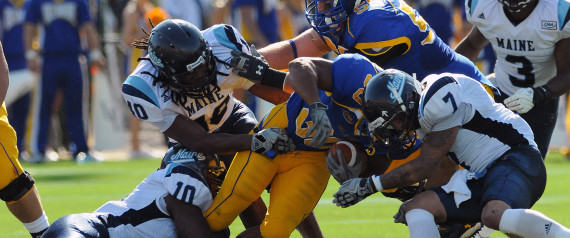
Even if you don't get a concussion, blows to the head during sports might still negatively affect the brain, a new study suggests.
The study shows differences in white matter between college athletes who participated in contact sports, such as football, and college athletes who participated in non-contact sports, such as track.
Plus, "the degree of white matter change in the contact sport athletes[1] was greater in those who performed more poorly than expected on tests of memory and learning, suggesting a possible link in some athletes between how hard/often they are hit, white matter changes, and cognition, or memory and thinking abilities," study researcher Dr. Thomas W. McAllister, M.D., of the Indiana University School of Medicine in Indianapolis, said in a statement. McAllister completed the study while at Dartmouth's Geisel School of Medicine.
For the study, published in the journal Neurology[2] , McAllister examined 80 varsity football and hockey players at Dartmouth who were concussion-free, as well as 79 track, crew and Nordic skiing athletes. The contact sport athletes wore helmets so that researchers could keep track of the acceleration time of the head after the athletes experienced a blow. All of the study participants also took tests on verbal learning and memory at the end of the sports season.
Some players in both the contact and non-contact sports did worse than expected on the tests; 20 percent of the contact sports athletes, and 11 percent of the non-contact sports athletes. These athletes also had more changes in the corpus callosum, a brain region made up of nerves to connect the brain's left and right sides, than those who did as expected on the test.
Hits to the head that do result in traumatic brain injury, such as concussion, have been linked with brain problems in other studies. For instance, a recent study from University of Mexico researchers found through brain imaging that the impact of a mild concussion on the brain can last even four months[3] after the injury occurred. And a study published last year in the journal Brain showed that people who endure repetitive hits to the head -- whether it be through sports or combat -- may have a unique brain damage pattern[4] , which progresses from focus problems to aggression and dementia.
References
- ^ degree of white matter change in the contact sport athletes (www.eurekalert.org)
- ^ journal Neurology (www.neurology.org)
- ^ last even four months (www.huffingtonpost.com)
- ^ unique brain damage pattern (www.huffingtonpost.com)
- ^ Send us a tip (www.huffingtonpost.com)
- ^ Send us a photo or video (www.huffingtonpost.com)
- ^ Suggest a correction (www.huffingtonpost.com)
0 comments:
Post a Comment